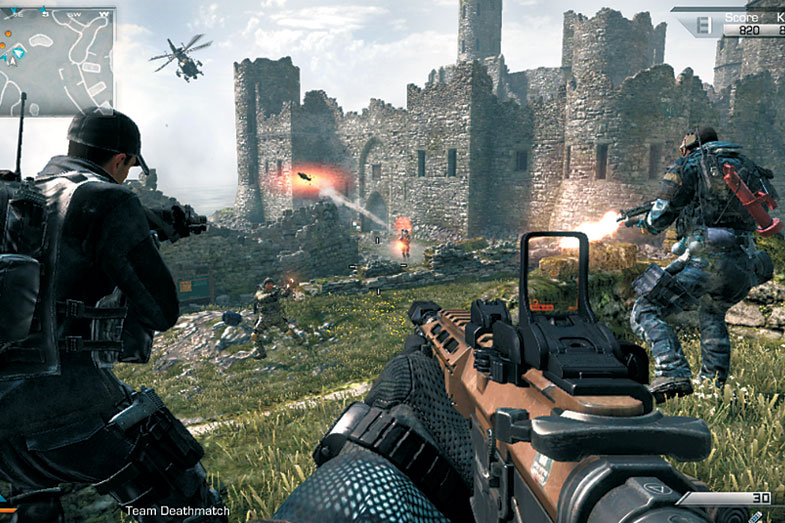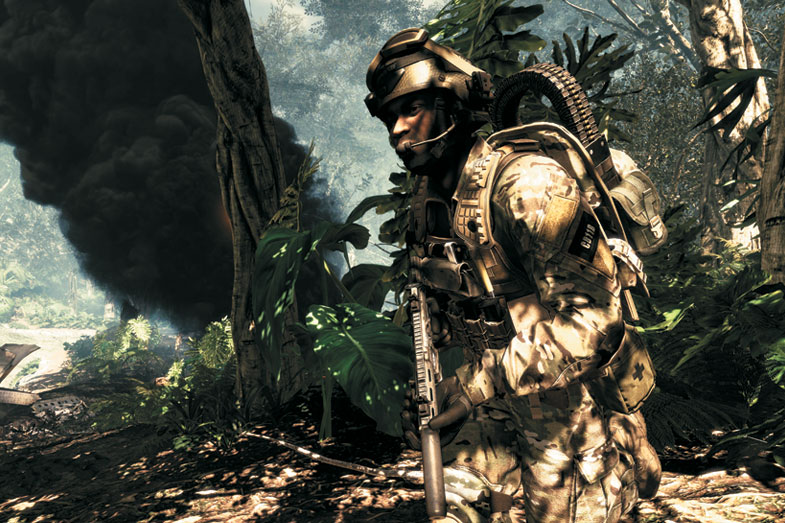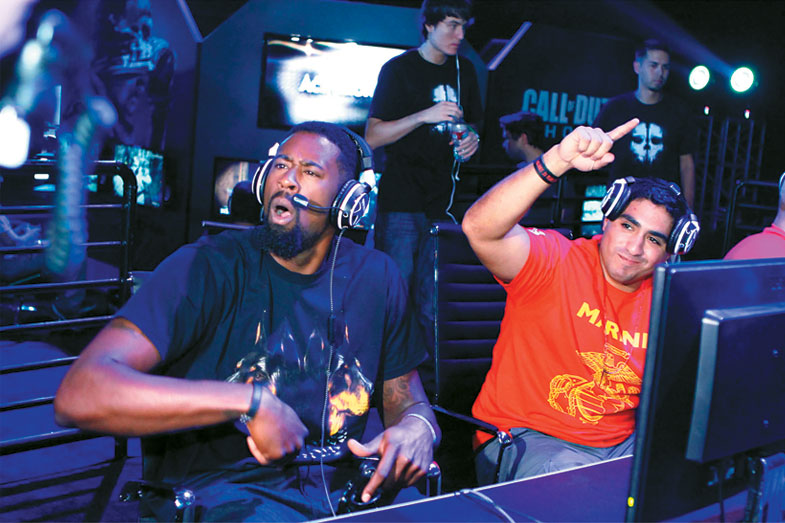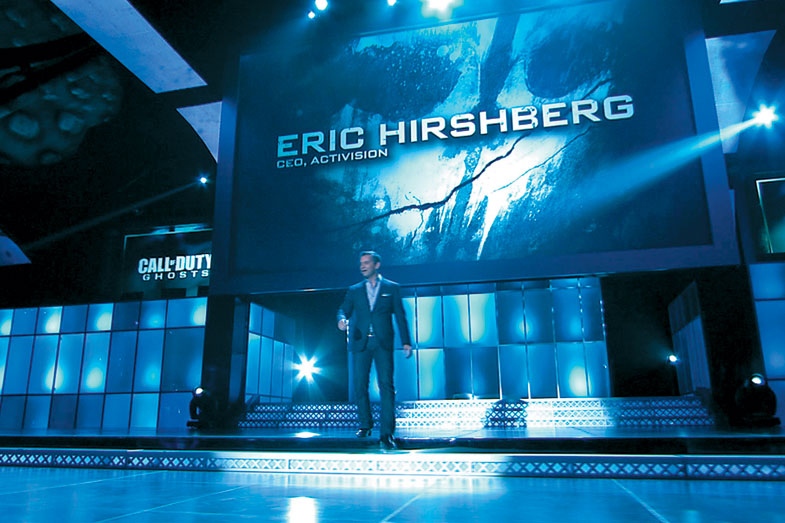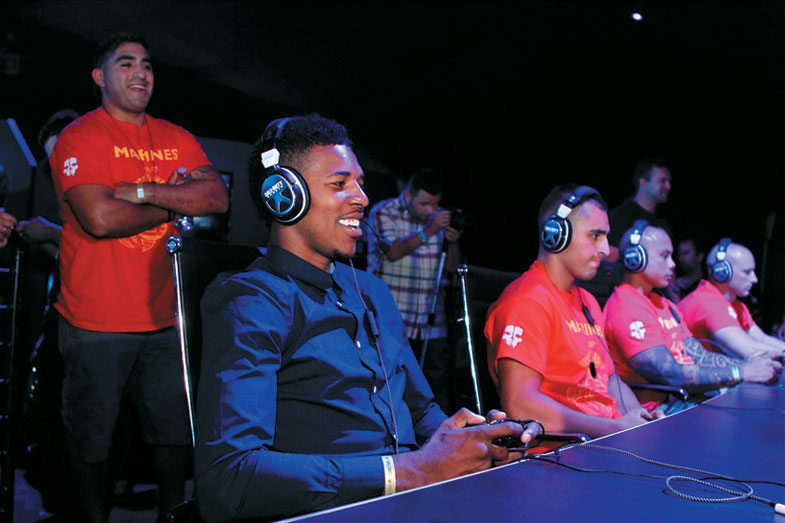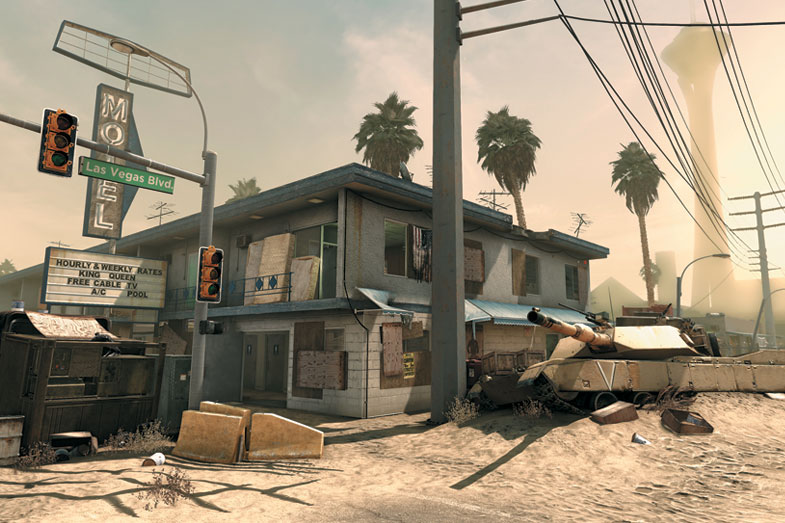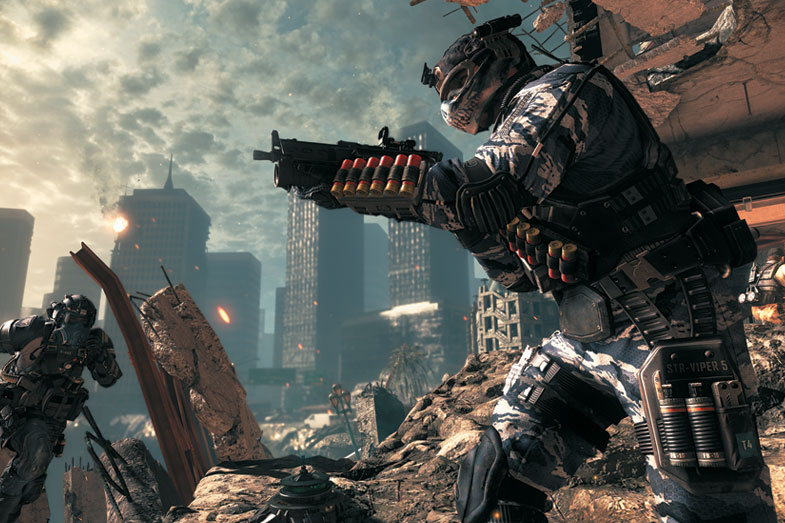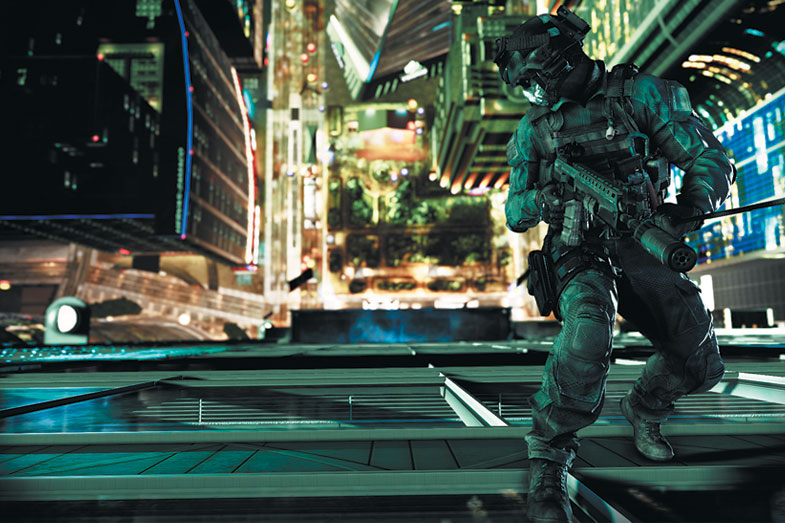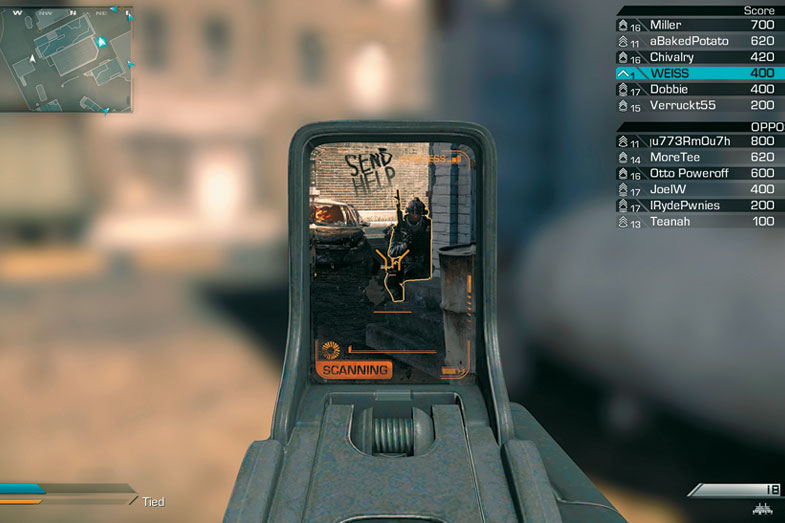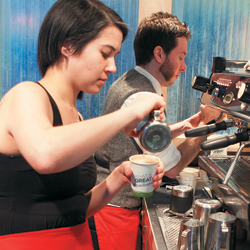photos: Activision Publishing Inc.; ncompass international inc.
| MEDIA EVENT |

Company: Activision
Publishing Inc.
Event: Call of Duty: Ghosts Global Multiplayer Reveal
Objectives: Maximize exposure, anticipation, and therefore sales for the upcoming Xbox One version of the "Call of Duty: Ghosts" video game.
Strategy: Spread word of the streamed media event through websites, social media, and gaming press, and then invite high-profile media, professional gamers, sports stars, and military personnel to the event where they can play the new game in front of a worldwide audience.
Tactics: Promote the event two weeks beforehand through websites, social-media channels, and other online-gaming-related venues that reach 100 million people. Invite hundreds of influencers including media, Marines, sports stars, and major electronic-sports figures. Stream the event live at a time that will reach the largest possible international audience. Stage live gaming competitions between attendees. Arrange for Eminem to record a song for the game, then debut it at the event.
Results: Racked up more than 3 million viewers and 100 million social-media impressions. Generated 2 million online views of the new game trailer within 24 hours of the event. Spurred a record $1 billion in first-day sales of the game.
Creative/Production Agency: NCompass International Inc., www.ncompassonline.com
Budget Range:
$2 – $4.9 million |

he history of warfare is by necessity also the history of innovation. To thwart the Axis powers with their game-changing kamikaze planes and V-2 rockets, for example, the U.S. Air Force attached incendiary bombs to bats and scorched Japanese cities, while the Soviet army soldered wings on tanks to blast German battlefields from the sky. That innovate-or-die truism is just as applicable in the video-game market, too. To combat competitors such as "Gears of War" and "Battlefield," Activision Publishing Inc.'s "Call of Duty" series has required a constant barrage of innovation to win unconditional victory in an industry that research firm Gartner Inc. forecasts will be worth $111 billion by 2015.
Launched in 2003, the "Call of Duty" series started life as a PC game, where players marched in the combat boots of American, British, and Russian troops as they virtually fought the Nazis in World War II. Over the next 11 years and throughout 10 versions of the game (and several assorted expansion packs), the Santa Monica, CA-based company improvised with machine-gun rapidity: Besides branching out "Call of Duty" to gaming consoles and handheld devices, Activision conscripted real-life stars such as Gen. David Petraeus into duty as game characters. Most impressively, Activision called an air strike on the single-fighter approach of many military-style games by dropping players into large-scale firefights, where they could be accompanied by platoons of other players logging on from anywhere in the world.
That "Band of Brothers" experience became as synonymous with "Call of Duty" as tanks are with Gen. George Patton. As a result of these shrewd enhancements, the "Call of Duty" series has sold more than 140 million copies, with 40 million players across all of its various titles, of which 10 million play some version of it every day. Players, consequently, spend more than a mind-boggling 120 hours on average with each game. To put the results of these numbers in perspective, the "Call of Duty" franchise has grossed more than the "Star Wars" and "Harry Potter" movies combined.
But when Activision wanted to unveil the newest multiplayer version of "Call of Duty: Ghosts" for Microsoft Corp.'s Xbox One gaming console, the company knew it had to avoid the mistake of fighting the next war armed with the strategies and tactics of the last one. And Activision understood that ignoring how its audience thinks would be the same as tap dancing through a minefield. "The key is peer action," says Dr. Lisa Galarneau, a socio-cultural anthropologist and video-game researcher who has worked with Microsoft and Amazon Inc. "If the game is supposed to be awesome and collaborative, then Activision had to show that collaboration in action. Its audience would need to see players they want to emulate demonstrating leadership, integrity, camaraderie, and 'badass-ery' during game play so that they'll want to buy the game and do the same."
Lock and Load
Allying itself with NCompass International Inc., a West Hollywood, CA-based experiential marketing company, Activision decided it would give no quarter to the traditional way it had staged previous events any more than the Navy Seals would use muskets for their next mission. Almost every year, Activision held a media event to unveil the latest multiplayer aspects of a given "Call of Duty" game. Typically, up to several hundred members of the media from around the world, hailing from gaming magazines to mainstream press, were invited. Activision would walk through the newest updates of a current game, and afterward the media reported on the latest developments to Activision's audience of gamers.
The trouble was, this rote, by-the-numbers approach was starting to feel about as old as the Trojan War. In this new skirmish for attention, however, Activision wanted the event equivalent of D-Day, an overpowering and irresistible marketing strike that would win the hearts, minds, and wallets of gamers. "Our biggest challenge with an event like this is always competing against our own legacy," says Jonathan Murnane, Activision's director of global experiential marketing. "We have done amazing events over the last several years, and we always want to reset the bar."
The strategy that Activision and NCompass decided to execute for the event, dubbed Call of Duty: Ghosts Global Multiplayer Reveal, was to subvert the standing and stale model of "We speak to the press, and the press speaks to our audience." Since the ultimate target of the launch was the millions of "Call of Duty" players, why not invite the people those players admire and even emulate when it comes to gaming, and then stream the event live to them online? That way, it would mirror the singular group-play nature of the game itself. Just as 62 percent of all gamers play in groups, either online or in person, per research from the Entertainment Software Association, Activision's event would in part consist of gamers playing with other gamers, watched in turn by gamers who play with each other.
Along with the usual media, the company would invite the sources its audience really pays attention to: a battalion of game developers, professional gamers, sports stars, and even members of the military whose opinions gamers heed like investors do Warren Buffet's. This was a brilliant stroke on the company's part. "Popular culture and military culture are hugely influential with 'Call of Duty' players," says Scott Steinberg, CEO of TechSavvy Global LLC, and a consultant to the consumer electronics industry. "Activision cherry-picked the best of those cultures, because they would resonate far more with gamers than the gaming press alone."
Microsoft Corp. spread word of the event using its Xbox Live conduits, reaching roughly 70 million gamers worldwide.
Additionally, in an era where DVDs, albums, and other media are stuffed like a loaded baked potato with extras and spoilers, the event would divulge never-before-seen footage from the game, as well as reveal an arsenal of new in-game features. Wary of falling behind in the musical arms race – luminaries such as Amon Tobin had worked on hit games including "Splinter Cell: Chaos Theory," and The National had penned a song for "Portal 2" – Activision partnered with Eminem to debut a song for "Call of Duty: Ghosts." Here, the company showed it was as methodical as a sniper carefully inching his way into position: Instead of grabbing a Justin Bieber to warble for the game, Activision chose someone its audience liked as much as soldiers appreciated camouflage. The company's own in-house research had discovered "Call of Duty" players possessed an unusually strong affinity for the 13-time Grammy winner Eminem. To maximize the song's impact – not to mention the event's allure – Activision partnered with the rap star to record a song that would debut at the event during an introduction that would air right before the game's new anthem played.
The company's goal was as simple as ready, aim, fire: Exceed previous benchmarks set for its streaming content at the GamesCom 2012 expo of 300,000 unique viewers, and surpass total views (the latter stat includes unique viewers coming back several times). It also wanted to reach 1 million online views of the new game trailer within 24 hours of the event. These metrics, it felt, would provide an accurate barometer of how well the game would shine – or shrivel – when it was released.
Invitation to a Gunfight
Two weeks before the event kicked off in July 2013 at the Event Deck in downtown Los Angeles, the company began putting its forces into position. It teased out details of the event on a variety of channels, including its main website, Facebook page, Twitter account, and various gaming sites, reaching about 25 million people globally. A few days later, Microsoft followed suit, sending out promos of its own for the event through its Xbox Live conduits, connected with nearly 70 million gamers around the world. Between the two companies, their efforts reached approximately 100 million people.
Activision Publishing Inc. hoped to reach 1 million online views of the new game trailer within 24 hours of the event.
Besides alerting tens of millions through those channels that the event would be streamed live online, Activision invited more than 300 media reps as well as professional and amateur gamers. Among the invitees were highly regarded electronic-sports figures; Ryan "Fwiz" Wyatt, a professional video-game commentator; and Ali-A, a game commentator from England with more than 3.5 million subscribers to his YouTube channel.
Moreover, the company also solicited appearances by NBA players DeAndre Jordan, Nick Young, and Anthony Bennett, and worked with the United Service Organizations Inc.'s branch in Los Angeles to draft Marines for the event. Of the Marines who applied, 15 would be selected by Activision based on their online "Call of Duty" profiles for the Xbox 360 that indicated a gung-ho enough level of involvement in the game.
Full Metal Racket
Like any military operation, timing was crucial to the Call of Duty: Ghosts Global Multiplayer Reveal event. Activision's audience wasn't limited to, say, the United States' four time zones, but was spread across all 24 of the world's. For that reason, it was imperative that Activision kick off the event at a time when the largest possible fraction of it would likely be awake and able to tune in: Hence, when the event commenced fire at 10:30 a.m. PST, Americans might still be making their initial Starbucks run, but Londoners, Berliners, and Muscovites would be just getting home from work, or settling in for the evening.
Firing the first salvo of the event, Eric Hirshberg, Activision's CEO, stepped up on the darkened stage to welcome the audience and introduce a new video trailer for "Call of Duty: Ghosts" that played on a massive trio of LCD screens behind him. Then, instead of droning on in a barrage of corporate buzzwords and blather, Hirshberg beat a hasty retreat, turning over the stage to the big guns: game developers and producers, who are to video games what Kalashnikov is to the assault rifle.
Executive producer Mark Rubin, for example, shocked and awed the crowd with a roster of the game's newest twists, e.g., the addition of Riley, a German shepherd, who sniffed out high explosives and chewed on enemy combatants. After Rubin finished, and the crowd was stoked for battle, the professional players were pitted against six of the Marines and the NBA stars in a live demonstration of the multiplayer game. Clashing against each other like Native American tribes against the 7th Cavalry Regiment at the Battle of the Little Bighorn, the two camps tried out the game's 30 new weapons, along with seven new multiplayer modes, such as Cranked, where the more kills you rack up, the more your agility and speed increase. From Shanghai to Seattle, the worldwide audience could see players like themselves engaged in firefights so intense that the game should have come with a coupon for post-traumatic stress disorder therapy.
Hundreds played "Call of Duty: Ghosts" on 120 gaming stations spread throughout the venue.
After the battle wound down, it wasn't exactly all quiet on the western front. Eminen blitzed the high-energy event with his appearance on the stage's three screens. Impacting the audience like a surface-to-air missile, the rapper and his tune, "Survival," fired up the cheering crowd for the next stage of the event. Once Eminem brought the song to a pounding finish, attendees banzai charged 10 banks of a dozen gaming stations each spread out over the venue's 42,000 square feet where they could play the Xbox One version of the game for the next several hours.
This Means War
In epic battles there is often a dramatic moment where one side unveils its secret weapon – like Henry V deploying men armed with the longbow against the numerically superior French forces at the Battle of Agincourt – and wins decisively. Instead of a 6-foot-long armor-piercing longbow, however, Activision had the power of digital communication in its quiver. "Gamers were using online bulletin boards and other virtual communities to exchange info about games as far back as the 1980s with games for the Commodore 64," says TechSavvy's Steinberg, "and then they moved to chat rooms and Internet forums in the 1990s. They trust each other almost as much as they distrust marketers."
That reliance on others' verdict of a video game's quality is as necessary to players as a Kevlar vest is to an infantry grunt. As Cord Silverstein, a digital strategist for Ignite Social Media, a Cary, NC, marketing company, has pointed out, gamers rely on a twosome of influencers and social networks to determine if a game gets a thumbs up or thumbs down. That led Activision to believe that social-media-savvy commentators, Marines, pro players, and others would fling a metaphorical stone and create a huge ripple in the pond of gamers.
While the attendees went feral on each other with submachine guns, assault rifles, incendiary grenades, and more mechanisms of mayhem in the virtual killing fields of the game, Ali-A and nearly 50 others posted videos of the merry melee. Ali-A's video alone topped 2.8 million views, with the other videos adding another 3.3 million. Watching others play video games might sound as boring as KP duty, but here Activision demonstrated how well the company knew its target: Posting videos of yourself playing video games is as popular a diversion among gamers as Mountain Dew Code Red and Doritos.
On the Twitter front, Eminem tapped out a #GhostsMP tweet, and its related retweets drove an estimated 25.6 million impressions on the social network. Activation's social-media team monitoring the Web found that the "Ghosts MP Reveal" keywords drove a total of 1,056,114 social-media mentions for the two weeks following the reveal. Helped by Eminem's video of "Survival" drawing as many as 3 million views a day, the event overall reaped about 102.7 million social-media impressions. Success on the social-media front was indispensable to the company. "Multiplayer games such as 'Call of Duty' attract a 17- to 30-year-old male audience that overlaps heavily with social-media use," says Michael Pachter, managing director of equity research for Wedbush Securities in Los Angeles, and a veteran video-game industry analyst. "The virality of social media is what drove awareness of the launch among the core demographic."
Activision eclipsed "Call of Duty" records, reaching $1 billion in first-day sales of the video game.
Making a Killing
"No battle plan survives contact with the enemy," Prussian Field Marshall Helmuth Carl Bernard Graf von Moltke said. That military maxim is revered as an almost unbreakable law of nature. Activision's event plan not only survived intact, but also achieved results that surpassed its wildest dreams. Hoping to eclipse online viewership numbers set at the GamesCom 2012 expo for unique viewers and total views, the company marshaled massive increases on both fronts. More than 3 million tuned in to the event, exceeding the GamesCom number of unique viewers by 1,044 percent. Aiming for 1 million online views of the new game trailer within 24 hours of the event, it amassed twice that amount, receiving 2 million. It was this abundance of results that inspired Corporate Event Awards judges to salute Activision, hailing it as "conceptually brilliant." According to one judge, "Activision created a competition inside an immersive environment, and absolutely captured the social-media audience of millions watching it."
But the real fallout of the event wouldn't truly be felt until "Call of Duty: Ghosts" went on sale three months later in November. By then, anticipation of the game, fueled by the event, media coverage, and collateral social-media mentions from gamers, had created a horde Attila the Hun would have envied. Instead of bloodthirsty Huns, however, this army comprised breathless buyers anxiously awaiting the game's release. While the previous installment in the "Call of Duty" series had set a video-game record with $500 million in first-day sales, "Call of Duty: Ghosts" nuked that achievement, reaching $1 billion in sales on its first day. Thanks to a media event armed with the tools and tactics that would appeal most to its worldwide audience, Activision was able to stride through the hyper-competitive gaming landscape and declare, like Julius Caesar did in Gaul, that it came, it saw, and it conquered. 



 he history of warfare is by necessity also the history of innovation. To thwart the Axis powers with their game-changing kamikaze planes and V-2 rockets, for example, the U.S. Air Force attached incendiary bombs to bats and scorched Japanese cities, while the Soviet army soldered wings on tanks to blast German battlefields from the sky. That innovate-or-die truism is just as applicable in the video-game market, too. To combat competitors such as "Gears of War" and "Battlefield," Activision Publishing Inc.'s "Call of Duty" series has required a constant barrage of innovation to win unconditional victory in an industry that research firm Gartner Inc. forecasts will be worth $111 billion by 2015.
he history of warfare is by necessity also the history of innovation. To thwart the Axis powers with their game-changing kamikaze planes and V-2 rockets, for example, the U.S. Air Force attached incendiary bombs to bats and scorched Japanese cities, while the Soviet army soldered wings on tanks to blast German battlefields from the sky. That innovate-or-die truism is just as applicable in the video-game market, too. To combat competitors such as "Gears of War" and "Battlefield," Activision Publishing Inc.'s "Call of Duty" series has required a constant barrage of innovation to win unconditional victory in an industry that research firm Gartner Inc. forecasts will be worth $111 billion by 2015.


